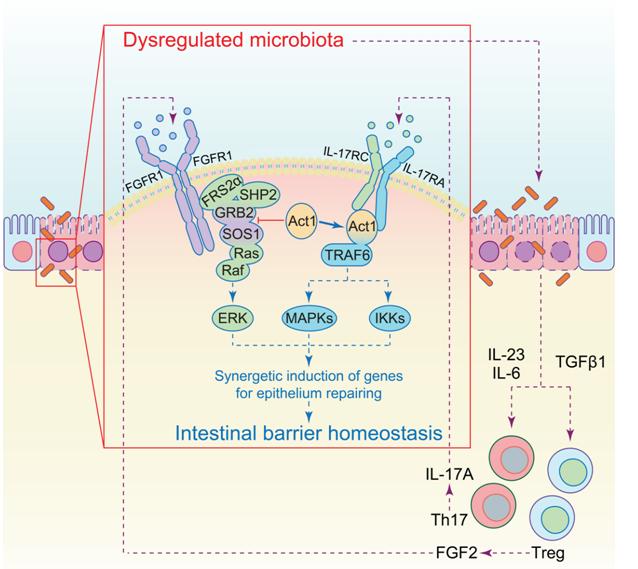
The intestinal microbiota plays a fundamental role in nutrient absorption as well as in immune system development for the benefit of human health. The mutualistic relationship between the microbiota and host is critical for maintaining gut homeostasis. The gut epithelium forms a first line of defense barrier against microbiota and pathogens. When the epithelium is damaged and not repaired properly, the gut microbiota likely becomes dysregulated (also known as dysbiosis) or mislocated, which activates innate immunity to induce inflammation through pathogen recognition receptors such as Toll-like receptors (TLRs), consequently leading to inflammatory diseases including inflammatory bowel disease (IBD) and colorectal cancer (CRC). However, it is not completely understood how the damaged epithelium is repaired to rebuild intestinal homeostasis to avoid dysbiosis-mediated pathogenesis.
In a recent study, scientists from the Institute of Health Sciences (IHS), Shanghai Institutes for Biological Sciences (SIBS), show that growth factor FGF2 synergized with interleukin-17 (IL-17) to induce genes for repairing of damaged epithelium. FGF2 or IL-17 deficiency resulted in impaired epithelial proliferation, increased pro-inflammatory microbiota outgrowth, and consequently worse pathology in a DSS-induced colitis model. The dysregulated microbiota in the model induced transforming growth factor beta 1 (TGFβ1) expression, which in turn induced FGF2 expression mainly in regulatory T cells. Act1, an essential adaptor in IL-17 signaling, suppressed FGF2-induced ERK activation through binding to adaptor molecule GRB2 to interfere with its association with guanine nucleotide exchange factor SOS1. Act1 preferentially bound to IL-17 receptor complex, releasing its suppressive effect on FGF2 signaling. Thus, microbiota-driven FGF2 and IL-17 cooperate to repair the damaged intestinal epithelium through Act1-mediated direct signaling cross-talk.
A paper describing this work, entitled “Growth Factor FGF2 Cooperates with Interleukin-17 to Repair Intestinal Epithelial Damage” was published online in Immunity on Aug 25, 2015.
This research was conducted by Dr. SONG Xinyang and graduate student DAI Dai under the supervision of Dr. QIAN Youcun and Dr. SHEN Nan at the Institute of Health Sciences, SIBS.
This research was supported by the National Natural Science Foundation of China, the 973 Program, the Science and Technology Commission of Shanghai Municipality, Collaborative Innovation Center of Systems Biomedicine and the Chinese Academy of Sciences.

Dysregulated microbiota-driven FGF2 and IL-17 cooperate to repair the damaged intestinal epithelium through Act1-mediated direct signaling cross-talk. (Image by Dr. QIAN Youcun's research group)
CONTACT:
QIAN Youcun
The Key Laboratory of Stem Cell Biology, Institute of Health Sciences, Shanghai Institutes for Biological Sciences, Chinese Academy of Sciences and Shanghai Jiao Tong University School of Medicine,
Shanghai 200031, China
E-mail: ycqian@sibs.ac.cn
Tel: 86-21-54923331

86-10-68597521 (day)
86-10-68597289 (night)

52 Sanlihe Rd., Xicheng District,
Beijing, China (100864)

